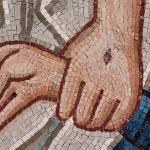Left Behind, pp. 144-150
Rayford's saintly dead wife has been plucked away by the very hand of God, thus elevating her above even the chaste pedestal on which he had kept her. This makes our hero's madonna/whore complex that much worse.
He thinks back again to when he "indulged in that make-out session at the Christmas party before Raymie was born." Earlier, he'd thought of that incident dismissively, as an inconsequential lapse in his otherwise flawless fidelity. Now he has stopped rationalizing his abortive affairs and begun weaving them into a whip and hairshirt with which to punish himself.
As Rayford ran all those memories through his throbbing head, he felt the deepest regret and remorse a man can feel. He felt like a failure. He was so unworthy of Irene.
Irene was purest good, a saint, and therefore chaste and sexless. Or perhaps she was chaste and sexless, and therefore a saint and the purest good. Those other women — Hattie, the nameless Christmas-party slut, the prostitutes that flitted about the edges of his subconscious — they were all "tawdry" and "beneath him." Rayford is reminding me more and more of John Leguizamo's character from "Summer of Sam." Leguizamo played a sex-obsessed lothario who cheated on his wife because she didn't do That Thing That Your Wife Won't Do. Then, when his poor wife offers, he is disgusted by her.
Rayford decides it was Irene's prayers on his behalf that kept him from "ultimately defiling his marriage with Hattie Durham." The immaculate Irene offered intercession for him. Hattie represented an ultimate defiling. Can a madonna/whore complex get any more literal?
The remainder of this chapter involves both Rayford and Buck feeling bad about treating Hattie badly, but still treating her badly.
First we get Rayford, whose new-found self-loathing causes him to reevaluate Hattie's behavior during their long, warped flirtation:
He had locked eyes with Hattie numerous times, and they had spent hours alone together over dinners in various cities. But she had never asked him to her room or tried to kiss him or even hold his hand. Maybe she would have responded had he been the aggressor, but maybe not. She might just as easily have been offended, insulted, disappointed.
This is a breakthrough of sorts. For the first time he entertains the possibility that Hattie isn't a tawdry slut. Yet she's not a saintly model of chastity either:
She had never suggested anything inappropriate, at least for her age. Young people were more touchy and flirtatious, and she claimed no moral or religious code. …
So if Hattie is not a madonna and not a whore, what is she? Rayford doesn't have a category for such women. The only woman he can think of in other terms is his daughter, Chloe, so he goes back to obsessing about her for another page or so.
And now he faced the darkest hours of his soul. He was nervous about Chloe. He wanted her home and safe in the worst way, hoping that having his own flesh and blood in the house would somehow assuage his grief and pain.
The phone rings, but it's not his daughter, it's Hattie. She asks him if he's heard from Chloe. "I'm waiting for her call right now, so I really have to get off!" he tells her, abruptly ending the call.
She sounded hurt. He was sorry about that, but not sorry that he had gotten rid of her for the time being. He knew she was only trying to help and be kind, but she hadn't been listening. She was alone and afraid just like he was, and no doubt by now she had found out about her family. Oh, no! He hadn't even asked about them! She would hate him, and why shouldn't she? How selfish could I be? he wondered.
Mark down the page number. Page 147. Rayford Steele acquires his first faint glimmer of self-knowledge. After more than a hundred pages of treating others' suffering as an obstacle and inconvenience, he begins to suspect that perhaps he is capable of selfishness. Sure, his main concern seems to be that Hattie doesn't hate him, so he's still thinking mainly of himself, just as his main concern over his daughter is that she return home to "assuage his grief and pain." But still, it's something.
Rayford tries to call her back, but her line is busy. She's already on the phone with Buck Williams:
She was crying. … She told Buck about her call to Captain Steele and brought him up to date on who Steele was, that he had lost his wife and son, and that she had been late calling him back after hearing her good news from Buck. "And then he just brushed me off because he's waiting for a call from his daughter."
"I can understand that," Buck tried, rolling his eyes.
Buck gets off the phone as quickly as he can, thinking, "Maybe Hattie showed more depth and sense when she wasn't under stress. He hoped so."
That's an odd little passage and it makes Buck seem like even more of a jerk. Yet it seems the authors want us to agree with Buck — to view Hattie as shallow and lacking sense for getting emotional during the most devastating calamity in the history of the world. The authors also seem, like Buck, to regard Hattie's response as essentially female. This is what women are like in a crisis, they seem to be saying. They cry and get all needy and become a burden to the menfolk. It's a kind of naked sexism unmitigated even by notions of chivalry.
After Buck's chilly politeness, Hattie calls Rayford again for a final serving of condescension. This time he dutifully asks about her family. He doesn't really care, but he doesn't want to appear selfish. Rayford is back to keeping up appearances. So much for the darkest hours of his soul.
When he hung up, Rayford sat next to the phone with a nagging feeling that he had for sure missed Chloe's call this time. It made him mad.
See what pretending to be unselfish gets you? That clinging bitch kept him from talking to his daughter by tying up the phone lines. I don't know why the phone-obsessed Steele family doesn't have call-waiting, but it's probably, like everything bad in Rayford's life, some woman's fault.
















